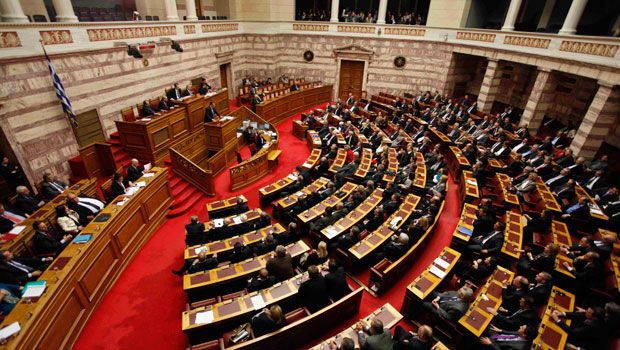ATHENS — The omnibus bill, more than 100 pages long and titled “Measures of Support and Growth for the Greek Economy,” won passage here in the middle of the night in March, as Parliament raced to meet a deadline set by Greece’s creditors.
Only afterward did a legislator from the governing New Democracy party notice an unsettling provision. Buried on page 78 was language that essentially gave retroactive immunity to thousands of workers in state-funded organizations that could shield them from future corruption prosecutions.
That change is among a flurry of new immunity provisions, often slipped into complex or unrelated bills this year, that have triggered outrage among law enforcement officials and critics of the government, who fear that long-awaited efforts to clamp down on corruption are being stymied.
“We cannot estimate how many individuals have been saved from criminal investigations and the money it involves,” said Kostas Tzavaras, the New Democracy lawmaker who discovered the change in the penal code while flipping through the new legislation one evening in his study. “It’s billions.”
Years of rampant corruption helped drive Greece to the brink of bankruptcy. Combating the problem is one of the government’s signal challenges as it tries to restore confidence that it is changing politics as usual and that the sacrifices required under its 240 billion euro, or about $305 billion, bailout are not being foisted on ordinary Greeks alone.
Mr. Tzavaras, who has called for a formal investigation by the Supreme Court, is not alone in speaking out about what he sees as quiet efforts to shut down corruption investigations and possibly prevent the clawing back of ill-gotten gains. Leandros Rakintzis, the Greek inspector general, angrily chided Parliament in September for passing laws legitimizing the illegal spending of state funds.
“I don’t think it is right that we spend the money to investigate only to have the laws give immunity retroactively,” he said a few days later in his Athens office. “Maybe there should be protection for political decisions. But if you stole a million dollars you should be treated like a common criminal.”
In a rare public complaint, the Association of Greek Judges and Prosecutors has also condemned not only the change to the penal code in the omnibus bill but also three other new immunity provisions.
One offered protections for officials who had handled disbursements from a pension fund. Another protected officials who had overseen school building expenses. The third prohibited prosecution of high-level officials who had been working in the Health Ministry but had received postgraduate study benefits.
In a statement, the prosecutors said they were seeing “law change after law change” often “inconsistent, incoherent and fragmentary,” a trend that raised suspicions about whether the laws were meant to “serve purposes beyond the national interest.”
The government has said that the change to the omnibus bill — the substitution of a clause — was a mistake and of no consequence to future prosecutions.
A month later, it passed a new law reinstating language that had long held officials in state-funded institutions criminally liable for embezzlement, breach of trust, document falsification and bribery.
But a wide range of experts and law enforcement officials in Greece agree that the retroactive immunity established by the passage of the omnibus bill still stands and remains problematic.
Despite repeated queries, the Justice Ministry offered no comment. Some experts say that without some of the new immunity provisions, Greece would be unable to attract top-flight officials.
“In order to get people — in many cases Greeks who have lived and worked elsewhere — to come here and take these jobs, you have to say that they will not be held responsible,” said Nicos C. Alivizatos, an expert in constitutional law at the University of Athens. “These laws are not so much to cover scandal but to allow government to function.”
Others scoff at such reasoning, saying new employees were not going to be held liable for crimes committed in past years. The immunities, they say, are actually a response to the success of anticorruption task forces that have been set up in recent years to answer growing public fury over government officials on the take.
Though the task forces operate on shoestring budgets, they have already had a few notable victories in a country that was rarely able to get convictions in the past.
Last year, for instance, in a landmark verdict, a former Greek defense minister, Akis Tsochatzopoulos, was found guilty of setting up a complex money-laundering network to cover the trail of millions of dollars in bribes that he pocketed from government weapons purchases.
Another official, Antonis Kantas, has admitted that he took so many bribes he cannot remember them all, including some that facilitated the purchase of $4 billion worth of submarines, some of which sit unfinished in a shipyard outside Athens.
“What you see is the creation of mechanisms for immunity and amnesty for their own,” said Zoe Konstantopoulou, a member of Parliament from the opposition leftist Syriza party who has published a book titled “The Black Book of Shame,” calling for a change in the wide immunity that legislators have enjoyed for decades.
Some law enforcement officials and government critics have said that the immunity provisions passed over the last three years go beyond even those that prosecutors have complained about publicly.
They note another law protecting bankers who have issued loans to political parties and a measure saying that excess amounts of severance payments disbursed before 2011 should not be pursued.
In addition, officials involved in Greece’s efforts to privatize state assets are to receive special immunities, as are members of Greece’s new Financial Stability Board, which was created to regulate how recapitalization money was allocated to Greek banks.
The critics say that immunities that have always existed are being manipulated for maximum effectiveness.
Parliament, for instance, must approve any effort to investigate its members, and few such permissions are ever granted. Of 89 felony cases against ministers that were sent by prosecutors to Parliament between June 2012 to May 2014, legislators voted to lift immunity only once, according to Ms. Konstantopoulou.
The one case in which immunity was lifted involved the former finance minister, George Papaconstantinou, who is under investigation for his handling of the notorious Lagarde list, which identified about 2,000 Greeks who held secret Swiss bank accounts.
Some experts say they believe that Mr. Papaconstantinou will escape prosecution because of yet another special statute of limitations protecting ministers: Under Greek law, after two legislative sessions, a minister can no longer be pursued for his previous actions.
Law enforcement officials, who spoke on the condition of anonymity because they were not legally allowed to comment on their work, said the new immunities were making it more difficult to prosecute officials for corruption.
“It means we have to find new ways to go forward with these prosecutions,” one official said. “It probably means that we have to find the money first, which can be very difficult and time consuming, and then prosecute for money laundering, not corruption.”



















